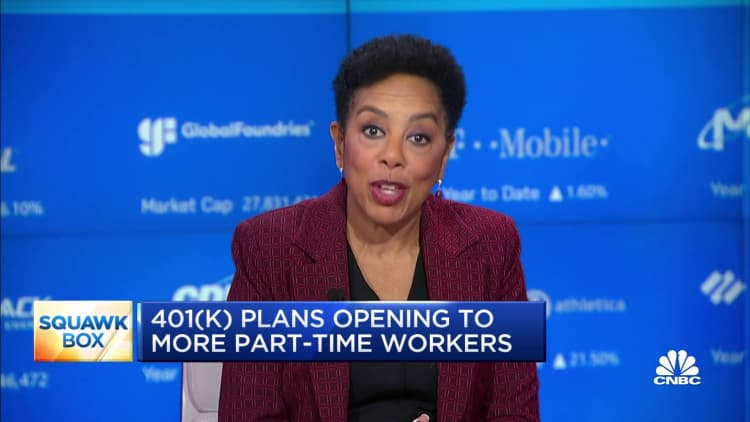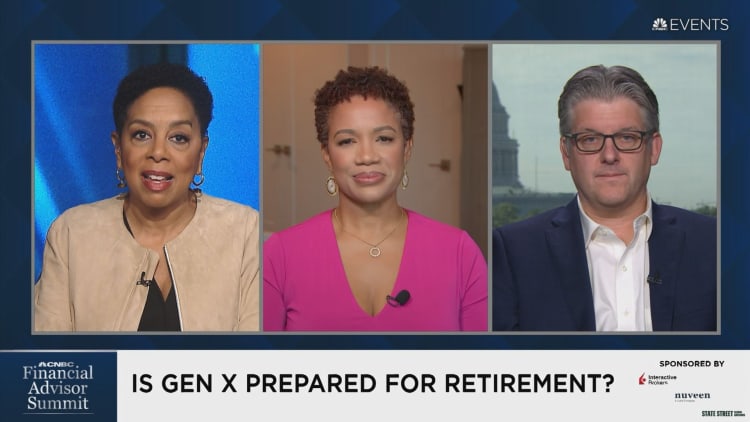
D3sign | Moment | Getty Images
Millions of people move money from a workplace 401(k) plan to an individual retirement account each year.
Such “rollovers” are common when workers retire or take new jobs at different employers. More than 5.6 million people rolled a combined $618 billion into IRAs in 2020, according to the latest available IRS data.
A rollover may be “the single largest transaction” many people make in their life, Fred Reish, a retirement expert and partner at law firm Faegre Drinker Biddle & Reath, recently told CNBC.
But deciding whether a rollover makes sense isn’t always straightforward: There are many factors to consider before moving the money. The Department of Labor recently proposed a regulation to improve the rollover advice investors get from brokers, insurance agents and others.
More from Personal Finance:
Not saving in your 401(k)? Your employer may re-enroll you
Why working longer is a bad retirement plan
More employers offering a Roth 401(k)
Of course, not all savers will have a choice: Some 401(k) plans don’t allow former employees to keep their money in the workplace plan, especially if they have a small balance.
Here are some key details to weigh when choosing to keep money in your 401(k) or move it to an IRA.
1. Investment fees
Investment fees are a big consideration for rollovers, financial advisors said.
Investment funds held in 401(k) plans are generally less costly than their IRA counterparts.
That’s largely because IRA investors are “retail” investors while 401(k) savers often get access to more favorable “institutional” pricing. Employers pool workers into one retirement plan and have more buying power; those economies of scale generally yield cheaper annual investment fees.
Rollovers to an IRA made in 2018 will cost investors an aggregate $45.5 billion over a 25-year period due to higher fund fees, according to an estimate by c.

Of course, not all 401(k) plans are created equal. Some employers more rigorously oversee their plans than others, and fees are generally cheaper for retirement plans sponsored by large companies rather than small businesses.
“Are you able to pay less by staying in your 401(k) plan?” said Ellen Lander, founder of Renaissance Benefit Advisors Group. “The larger the plan, the more resounding that ‘yes’ will be.”
The bottom line: Compare annual 401(k) fees — like investment “expense ratios” and administrative costs — to those of an IRA.
2. Investment options
Savers may benefit from leaving money in a 401(k) if they’re happy with their investments.
Certain investments — like guaranteed funds or stable value funds, which are kind of like high-earning cash or money market funds — aren’t available in IRAs, Lander said.
But 401(k) options are limited to those selected by your employer. With an IRA, the menu is often much broader.
“You’ll want to look at whether your 401(k) is a good plan with diverse, low-cost investment choices and fees,” said Carolyn McClanahan, a certified financial planner and founder of Life Planning Partners in Jacksonville, Florida. She is also a member of CNBC’s FA Council. “If it isn’t a good plan, we encourage rolling it into a new 401(k) or IRA.”
Certain retirement investments like annuities, physical real estate or private company stock are generally unavailable to 401(k) savers, said Ted Jenkin, a certified financial planner based in Atlanta and founder of oXYGen Financial.
Another consideration: While the investment options may be fewer in a 401(k), employers have a legal obligation — known as a “fiduciary” duty — to curate and continually monitor a list of funds that’s best suited to their workers.
Unless you’re working with a financial advisor who acts as a fiduciary and helps vet your investments, you may not be putting money into an IRA fund best suited for you. Too many choices in an IRA may also lead to choice paralysis and adverse decision-making, advisors said.
3. Convenience
Sturti | E+ | Getty Images
Having multiple 401(k) accounts scattered among multiple employers may be a challenge to manage, said Jenkin, a member of CNBC’s FA Council. And your current employer may not accept rollovers into your 401(k) from a previous employer’s plan.
Aggregating assets in one IRA may simplify management of your nest egg relative to factors like asset allocation, fund choice, account beneficiaries and annual required minimum distributions, he said.
“If you’re babysitting three kids in three different backyards, it would be tough to keep your eye on all three,” Jenkin said. “By getting them in one, it’s a lot easier to watch them all.”
4. Creditor protection
Investors generally get stronger creditor protections in a 401(k) than an IRA, courtesy of federal law, advisors said.
Your 401(k) money would generally be protected from seizure in the event of bankruptcy or if you faced a civil suit from someone who, for example, fell and got injured in your home, Lander said.
IRA assets may not be protected, depending on the strength of state laws.
Exceptions to 401(k) protection may occur during divorce proceedings or for taxpayers who owe a debt to the IRS, Lander said.
5. Flexibility
IRAs generally offer investors control over the amount and frequency of their withdrawals. Many 401(k) plans may not allow retirees as much flexibility.
For example, just 61% of 401(k) plans allowed periodic or partial withdrawals by retirees in 2022, and 55% allowed installment payments, according to the Plan Sponsor Council of America, a trade group.

If this is the case, Lander advises workers to ask their employer’s human resources department about the policy and whether it can be amended.
“That’s a quick fix,” she said.
6. Company stock
Workers who own company stock in their 401(k) can get a tax benefit for keeping those holdings in-plan rather than rolling them to an IRA, Jenkin said.
“That’s a big advantage for people who believe in their company stock and leave it in for a long period of time,” Jenkin said.
7. Loans
There’s sometimes an ability for 401(k) savers who part from an employer to keep taking loans from the 401(k) account they left behind, advisors said. You can’t borrow money or take a loan from an IRA.
The 401(k) provision is generally rare: About 1% of plans allow people to take new loans after separation from service, according to PSCA data.
However, investors who have access to that provision and find themselves in a financial pinch can take a 401(k) loan; assuming they follow the repayment rules, such people would pay themselves back with interest and wouldn’t suffer adverse tax consequences, Lander said.
Don’t miss these stories from CNBC PRO: